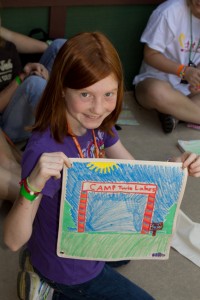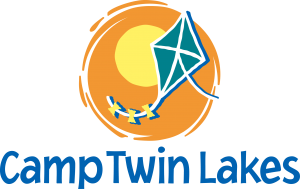Share This
Related Posts
Tags
Camp Twin Lakes
By Erica Rascón on Feb 25, 2013 in Giving, People | 2 Comments
 Since its humble beginnings in 1993, Camp Twin Lakes has touched the lives of more than 50,000 disabled and sick children. New ventures for this year, its 20th anniversary, ensure that number will continue to grow as camp staff, sponsors, and partners team up to reach more youth. This spring, the camp buzzes with activities, even as the dog days of summer draw near.
Since its humble beginnings in 1993, Camp Twin Lakes has touched the lives of more than 50,000 disabled and sick children. New ventures for this year, its 20th anniversary, ensure that number will continue to grow as camp staff, sponsors, and partners team up to reach more youth. This spring, the camp buzzes with activities, even as the dog days of summer draw near.
Since 1993, Camp Twin Lakes has offered weekend and week-long camp excursions for young Georgians with disabilities and serious illnesses. Set against the forested backdrop of Winder, Rutledge, and Warm Springs, participants are encouraged to develop skills sets that will prepare them for a productive and promising future.
Over 50 organizations, or camp partners, join forces to form Camp Twin Lakes. Each offers the camp’s participants a wide range of opportunities and activities that foster physical, mental, and social development. Each camp experience is customized for the personal needs of the child attending. Through camp activities, children are encourages to form and meet goals, build confidence, develop friendships and—of course—have loads of fun.
“Kids walk away transformed, especially our campers who come in from the outside world where they feel so different from other kids,” said Audrey McMenamy, grant writer for Camp Twin Lakes.
“They may be the only child in their class undergoing chemo therapy, or struggle with severe asthma. The camp sessions are arranged for kids with similar conditions so kids don’t feel different, isolated. Together they gain new skills and the walk away with great friendships. They get confidence from trying new things together and not being afraid.”
Kathy Russell, Communications Manager, noted how quickly the camps help children break through perceived impossibilities. “Our campers face various challenges, and they face limitations on what they can accomplish by their parents, teachers, and sometimes themselves. We remove the limitations in a safe setting: horseback riding, zip lining, things they wouldn’t normally push themselves to do, they can do here with support from counselors and peers. They grow tremendously in their capabilities. The overnight camps also help them develop in their maturity and sense of responsibility. Parents always tell us about how their children have changed over the weekend. Kids come back more motivated and independent, in a good way.”
Children who are currently hospitalized may also attend camp and reap its benefits. “Camp to Go is great,” says McMenamy. “Just last week I went on a winter weekend camp retreat at a local children’s hospital. We bring camp to the kids. We brought archery to children’s bedside and put paint on the end of Q-tips. They used a straw and blow towards an archery target. We also brought art supplies for them to make jewelry and art while in bed. Just like at camp, we ended the day with smores and a campfire sing-along for those who could join us.” The campfire, a lit display of fabricated logs, was still plenty of fun for everyone. “It’s the spirit of camp and people get that,” reflects McMenamy.
Youth aren’t the only ones who benefit from camp excursions. Camp Twin Lakes is also reaching out to adults whose families are affected by disabilities. Family Warrior Weekend welcomes Georgia’s service members who have been wounded or otherwise disabled by the Global War on Terror operations. These wounded warriors and their immediate family members participate in indoor and outdoor recreational activities such as team sports, aquatics, art workshops, and craft making. These outlets allow families to reconnect and strengthen their bond without the daily stresses of household duties. Additionally, counseling services are offered to equip families with adaptation and coping mechanism to ease the challenges faced by readjusting to civilian life.
“I can’t tell you how important programs like these are,” explains Daniel Willington, a veteran who served in Operation Iraqi Freedom. “They’re especially important for veterans with families. Some vets focus on limitations after we’re injured. Or we don’t have a supportive place to try to gain our strength and skills back.”
The camps can change that for veterans and their families. “These camps provide a supportive atmosphere.” Willington has attended other similar camps to rebuild his relationship with his young son and daughter, while also strengthening his self confidence. “Confidence is sometimes the last thing people on the outside think about when you’re dealing with a disability but it really matters the most. Confidence can determine whether you stand up to be a good father to your kids or let your situation get you down.”
 Camp Twin Lakes programming continues to grow and develop, offering more opportunities for disabled individuals that enrich their lifestyles through personal development. McMenamy couldn’t contain her enthusiasm over the new organic farm at one of the camps. It will eventually serve as a prototype for the other camps.
Camp Twin Lakes programming continues to grow and develop, offering more opportunities for disabled individuals that enrich their lifestyles through personal development. McMenamy couldn’t contain her enthusiasm over the new organic farm at one of the camps. It will eventually serve as a prototype for the other camps.
“Gardening has been one of our campers’ favorite activities. They gather eggs from the hen house and milk from the goats—the love the goats—and there is a little kitchen near the vegetable garden where they can use the herbs and veggies to make pizzas and other meals. There is a cooking class that lets them use the fresh fruits and veggies right from the garden.”
The project has gone so well that Camp Twin Lakes hired Nathan Fussell, a Farm Fellow who lives on site, to maintain the farm and plan the growth of the program. “He’s done an exceptional job in the few months that he has been here,” says Russell. “Things are picking up really fast. We’re using the garden and the kitchen as a learning tool, not just a fun activity. Kids these days eat a lot of processed food so it’s good to let kids get their hands dirty, to see that the food comes from the earth. They can reconnect with their food, it source, and experience the best health benefits that food has to offer.”
2013 will also mark the expansion of the paddle board program, which was spearheaded last summer at the Rutledge camp. Participants of all ability levels were able to experience the joys of a waterfront activity. Kids that cannot stand or have the ability to paddle get involved with the assistance of camp counselors. Paddle boarding sessions will soon be available at all three camp sites.
A child’s ability to attend camp is not determined by financial obligations. Camp Twin Lakes covers 80 percent of camp expenses; remaining expenses can be furnished by scholarships, such as those sponsored by Yardi. 15 children were able to attend overnight camps with the aid of Yardi’s sponsorship.
“That’s 15 more kids and can-do attitudes,” says McMenamy. And hopefully, 15 happy and confident smiles.










I’m proud and happy that Yardi has donated to Camp Twin Lakes for each of the past couple of years. My son, a cancer survivor, was a camp attendee for a few years and had a really wonderful experience there. I witnessed first hand how Camp Twin Lakes enriched the lives of so many children, and I’m glad we can make a difference in so many lives by supporting this great cause. Also, thanks for featuring the camp in our blog!
Thanks for your response, Don. The camp is truly a jewel and a wonderful organization. Lovely people to work with, too!